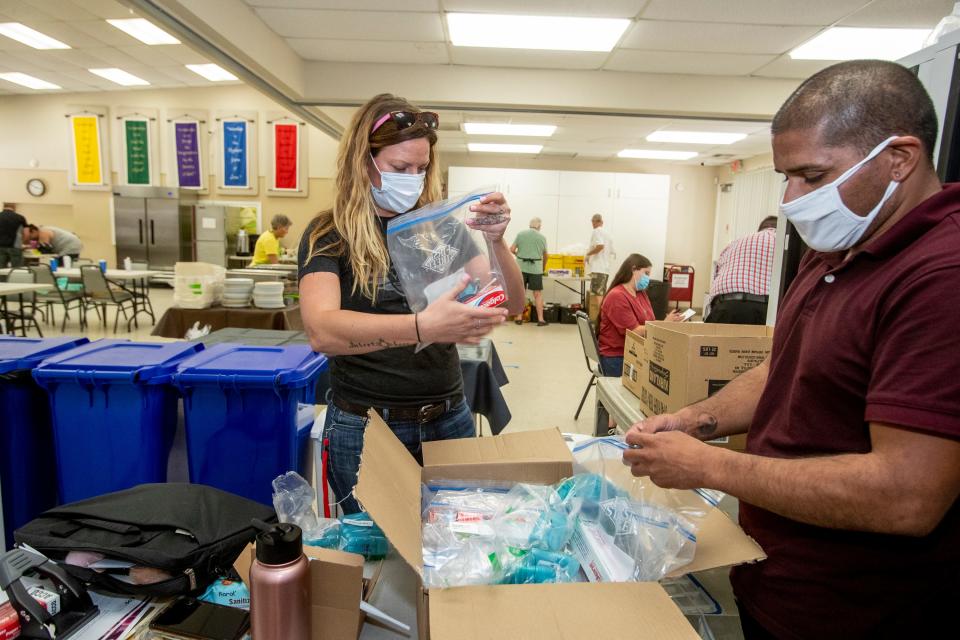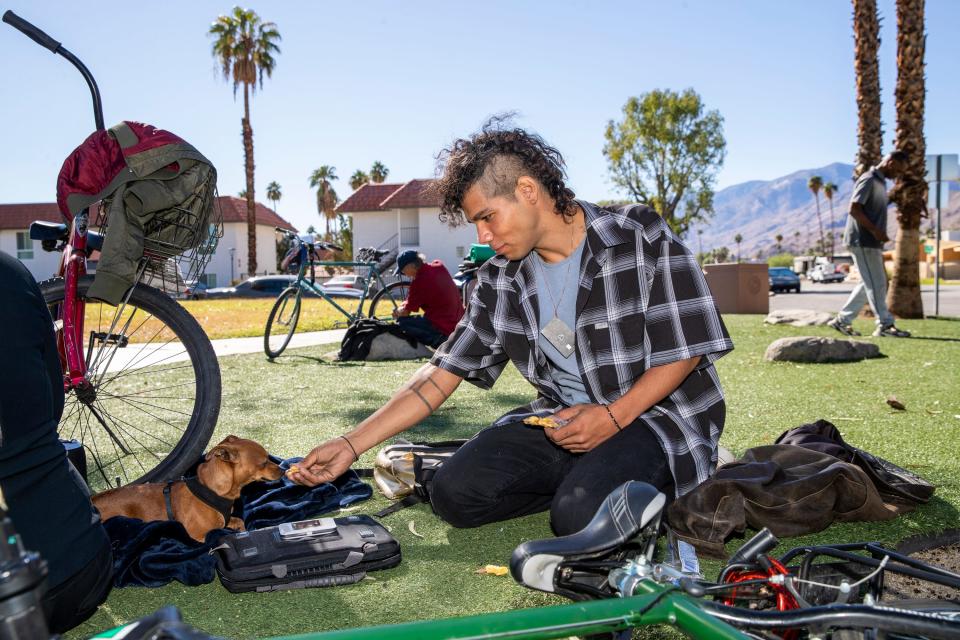Homeless clients share mixed feelings on treatment at Palm Springs cooling center; what's next following closure
The cooling center operating out of the United Methodist Church of Palm Springs, run by Riverside County and Martha's Village and Kitchen, officially closed its doors this week, and homeless clients have had a mixed bag of experiences during their stay, including some alleging they were "being treated as less than human."
The county and Martha's Village, an Indio-based homeless services provider, opened the 24-hour cooling center, located at 1555 E. Alejo Road, on July 6. The center provided clients with food and a place to sleep at night, as well as access to various services, with the ultimate goal of finding permanent housing.
Martha's Village President and CEO Linda Barrack said on Friday the center has served more than 200 unduplicated clients and linked them with resources such as housing vouchers and health services, and even reunited them with families.
The center was originally set to close at the end of September, but additional funding secured by District 4 Supervisor V. Manuel Perez allowed it to stay open through October.
That additional month ended up being a lifeline for Lawrence Brady and his nephew, David Villegas. The two were living in Redlands until someone got a hold of Villegas' debit card and "wiped out everything" at the beginning of the October, Brady said. They came up short financially and couldn't pay rent, so they headed to the Coachella Valley "to try to start something different."
They spent the last two weeks of October at the cooling center. Not being on the street, being fed and getting clothing have been some of the biggest benefits Brady and Villegas have received. They also put in an application for a housing voucher. Until a space becomes available, they plan to stay at a motel in Palm Springs. Brady works as a driver, while Villegas' financial situation has improved.

Brady said he didn't know the center existed before coming to the valley, but "it was helpful." The two also utilized services at the Palm Springs Access Center, also operated by Martha's Village, located at the site of the former Palm Springs Boxing Club at 225 S. El Cielo Road near the airport.
Related: Palm Springs to temporarily close Baristo Park to address health, homeless issues
More: How has Palm Springs been spending its $10M state allocation for homelessness?
Some, though, haven't had a positive experience. Marc Cosenza, who utilized the center for months, said on Friday he's "thankful for the shelter and food, but not thankful for being treated as less than human" by Martha's Village staff members. He alleged that staff members would "talk down to us" and "tell us to listen or we don't get a cot" to sleep on.
A woman who identified herself as Sarah said the cooling center was "like a prison" and alleged staff members would "call us children." She has been at the center since Oct. 10.
A man who identified himself as Richard, who utilized the center since July, agreed with Sarah's sentiment, adding that it was "inefficient."
At the Access Center, Cosenza said he finds similar treatment.
"If they're going to be there to help people, help people," Cosenza said. "They can do more with personal relationships."
Arlene Rosenthal, director and president of Well in the Desert, an organization that serves people experiencing homelessness, said she also heard complaints about treatment. Those who are homeless "need more compassion and more understanding than ever before," she said, and hopes there will be a more "compassionate center where people are treated with dignity" available in the future.
The Well in the Desert is no longer operating at its former Calle Encilia location, nor does it provide services at the Access Center aside from giving rides to clients, Rosenthal said.
On Tuesday, Barrack said though she agrees "the tone should be softer" from staff, additional rules had to be put in place due to the COVID-19 pandemic.
Hearing the center be compared to a prison was "impactful," but she said a curfew had to be set. Once an individual was in the center, they had to stay inside, and if they left, they could not return for the night. She said that was a "very normal rule." Clients were also assigned to a table to eat at and they would be called up by table number to get their meals.
"As an adult, I get it. The rules and being under somebody else's supervision is difficult, especially for the homeless who are used to not having that in their lifestyle," she said. "It is always a dance that staff has, but I feel that Martha's staff did an amazing job based on the fact that they housed and sheltered 200 people."
At the Access Center, Barrack said she received one complaint from an individual over having to sign in, saying they felt "we were just after their signature." She said the rule is in place so that the center can track what services an individual may need.
If individuals have concerns or issues with how staff is treating clients, there is a form they can fill out confidentially, Barrack said. She added that staff undergo regular trainings in diversity and that they're "not uncaring by any means."
"We can't be all things to all people, that would be an amazing feat, but we have to work together and build an understanding and relationship," Barrack said.
'What now?'
Barrack said she heard a lot of "what now?" questions during the last week of October. Cosenza, Sarah and Richard said they didn't know where they would go once the cooling center closed.
Though Martha's Village tries to get as many individuals placed into housing solutions, vouchers take time, sometimes even months, explained Barrack, and on Friday, she said she was just starting to see "about a few of them come down."
"It's a very slow process and a lot of the bottlenecking is the system itself," Barrack said. "It is also people are receiving and getting vouchers and it can take quite some time for them to find housing that is affordable."
Related: Two mobile health, wellness units to take services on the road for homeless in Cathedral City
More: CV Housing First lodges 49 clients in two quarters; program extension recommended
Affordable housing is difficult for a homeless individual to enter into, Barrack explained, because they need a good credit score and a certain amount of income.
Housing vouchers also require funding, and people get placed based on their need. Families, seniors and disabled individuals often get priority.
Cosenza's main goal is to avoid sleeping on the street, he said on Friday, and he's "working on" finding a housing solution. He currently receives around $1,080 each month in benefits.
'We need a place'
Though the cooling center is closed, Barrack encourages homeless individuals to go to the Access Center where they can continue working with case managers and employment specialists. Since it opened on Aug. 31, the center has helped 244 unduplicated clients.
More: Palm Springs council narrows homeless navigation center discussion to two sites
Wraparound services available at the daytime center include: assistance with health, disability, food stamps, identification cards and social security; vouchers for laundry services, bus passes and clean clothes; computer lab and phones; periodic on-site medical services or referrals; case management; access to behavioral health services; employment help; a family reunification program; and access to other support services such as cash and non-cash benefits. Clients also have access to showers, snacks and hygiene supplies.

But Barrack, along with many others, believes more needs to be available for the homeless population in Palm Springs and western valley. Currently, there are no overnight shelters available in the city.
That need was recently reinforced when four individuals experienced medical distress, and staff at the Access Center had to call 9-1-1, Barrack said. If it was nighttime and those individuals were out on the street, they might not have gotten the assistance they needed.
"We need a place, and I know that the city council is working on it, and I know that it's not a popular topic, but it's a much-needed discussion, and time is not on our side," Barrack said. "I can help you during the day, but I can't keep you safe at night."
The Palm Springs City Council recently heard a proposal for a homeless navigation center and zeroed in on two possible sites. City staff will provide additional information on a McCarthy Road site and a Ramon Road site at Thursday's meeting.
Ema Sasic covers health in the Coachella Valley. Reach her at ema.sasic@desertsun.com or on Twitter @ema_sasic.
This article originally appeared on Palm Springs Desert Sun: What's next for homeless after closure of Palm Springs cooling center

